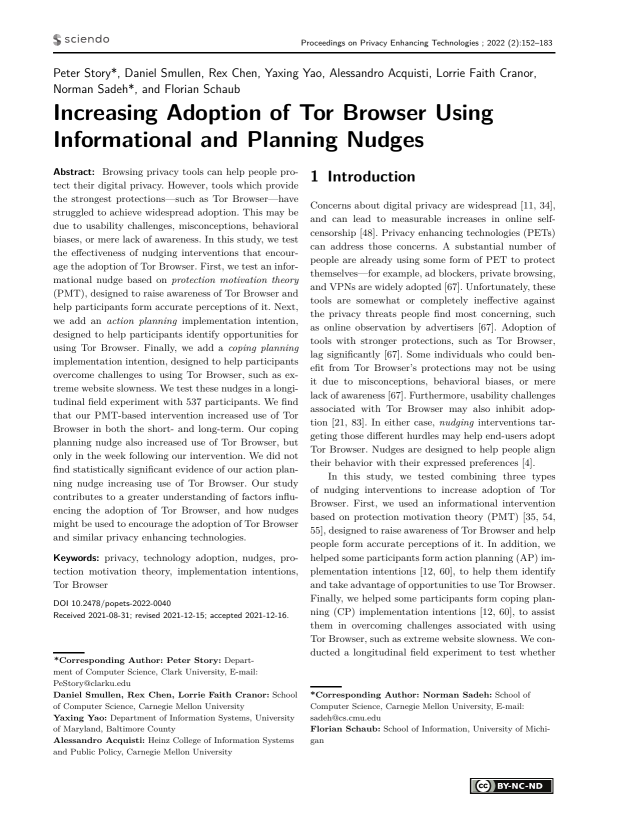Increasing Adoption of Tor Browser Using Informational and Planning Nudges
Authors: Peter Story (Department of Computer Science, Clark University), Daniel Smullen (School of Computer Science, Carnegie Mellon University), Rex Chen (School of Computer Science, Carnegie Mellon University), Yaxing Yao (Department of Information Systems, University of Maryland, Baltimore County), Alessandro Acquisti (Heinz College of Information Systems and Public Policy, Carnegie Mellon University), Lorrie Faith Cranor (School of Computer Science, Carnegie Mellon University), Norman Sadeh (School of Computer Science, Carnegie Mellon University), Florian Schaub (School of Information, University of Michigan)
Volume: 2022
Issue: 2
Pages: 152–183
DOI: https://doi.org/10.2478/popets-2022-0040
Abstract: Browsing privacy tools can help people protect their digital privacy. However, tools which provide the strongest protections—such as Tor Browser—have struggled to achieve widespread adoption. This may be due to usability challenges, misconceptions, behavioral biases, or mere lack of awareness. In this study, we test the effectiveness of nudging interventions that encourage the adoption of Tor Browser. First, we test an informational nudge based on protection motivation theory (PMT), designed to raise awareness of Tor Browser and help participants form accurate perceptions of it. Next, we add an action planning implementation intention, designed to help participants identify opportunities for using Tor Browser. Finally, we add a coping planning implementation intention, designed to help participants overcome challenges to using Tor Browser, such as extreme website slowness. We test these nudges in a longitudinal field experiment with 537 participants. We find that our PMT-based intervention increased use of Tor Browser in both the short- and long-term. Our coping planning nudge also increased use of Tor Browser, but only in the week following our intervention. We did not find statistically significant evidence of our action planning nudge increasing use of Tor Browser. Our study contributes to a greater understanding of factors influencing the adoption of Tor Browser, and how nudges might be used to encourage the adoption of Tor Browser and similar privacy enhancing technologies.
Keywords: privacy, technology adoption, nudges, protection motivation theory, implementation intentions, Tor Browser
Copyright in PoPETs articles are held by their authors. This article is published under a Creative Commons Attribution-NonCommercial-NoDerivs 3.0 license.


